Memoirs
of
Francis Dubose Richardson
This is a 36-page document that was in the possession of my mother, Annie Lee Richardson Schlatter (1924 – 2007), at time of her death. She had this document for several years. The provenance of the document is unknown.
In its current form, the document consists of five introductory pages and 31 pages of memoirs; the document is photocopied, not an original.
The three introductory pages are :
- Cover
- Introductory
- Photo of Francis DuBose Richardson
The cover page is handwritten and reads:
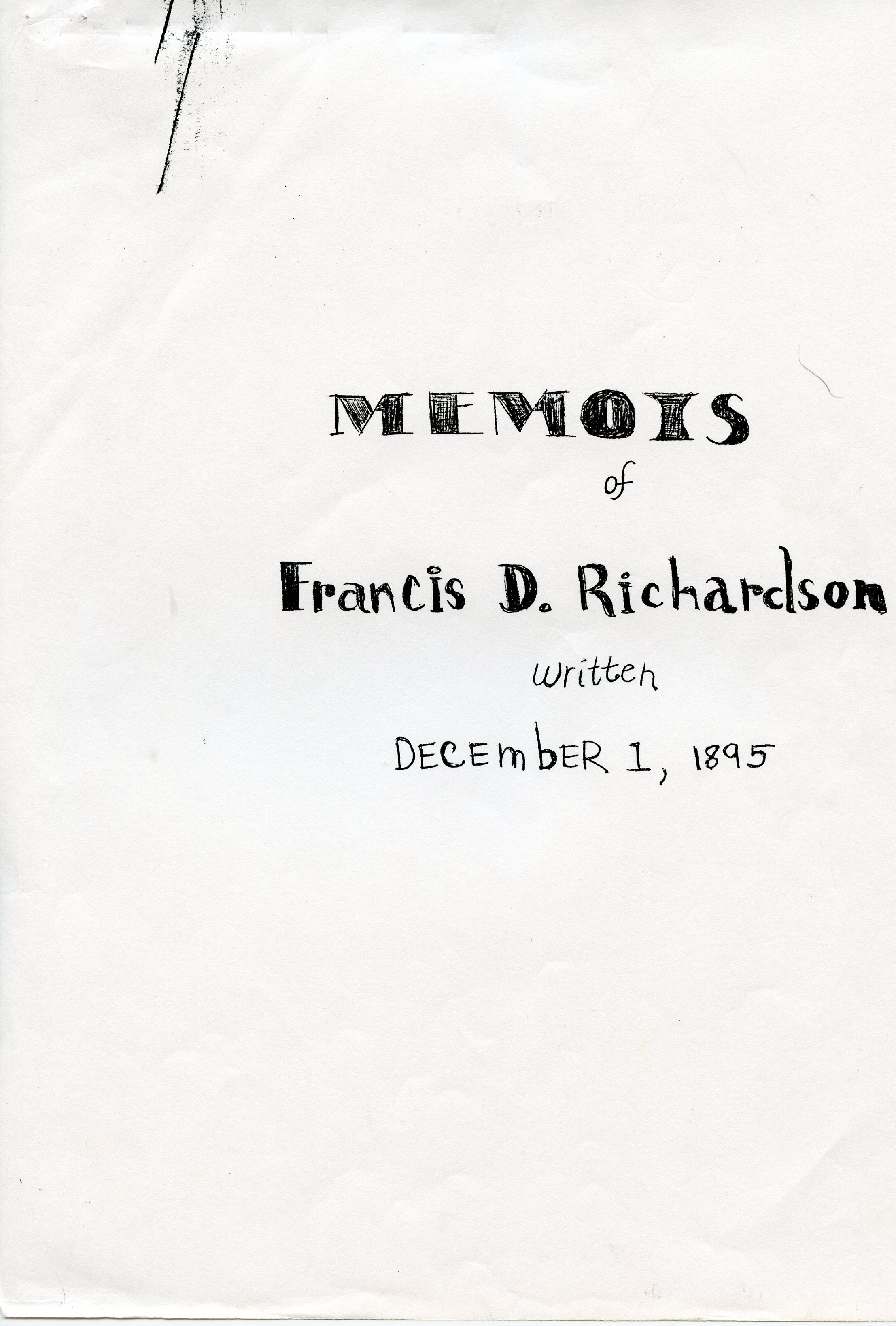
At the bottom of the single introductory page is the notation: “TOM LEE GIBSON, Friars Point, Mississippi, Christmas, 1930.”
The introductory page is followed by this photo of Francis DuBose Richardson.
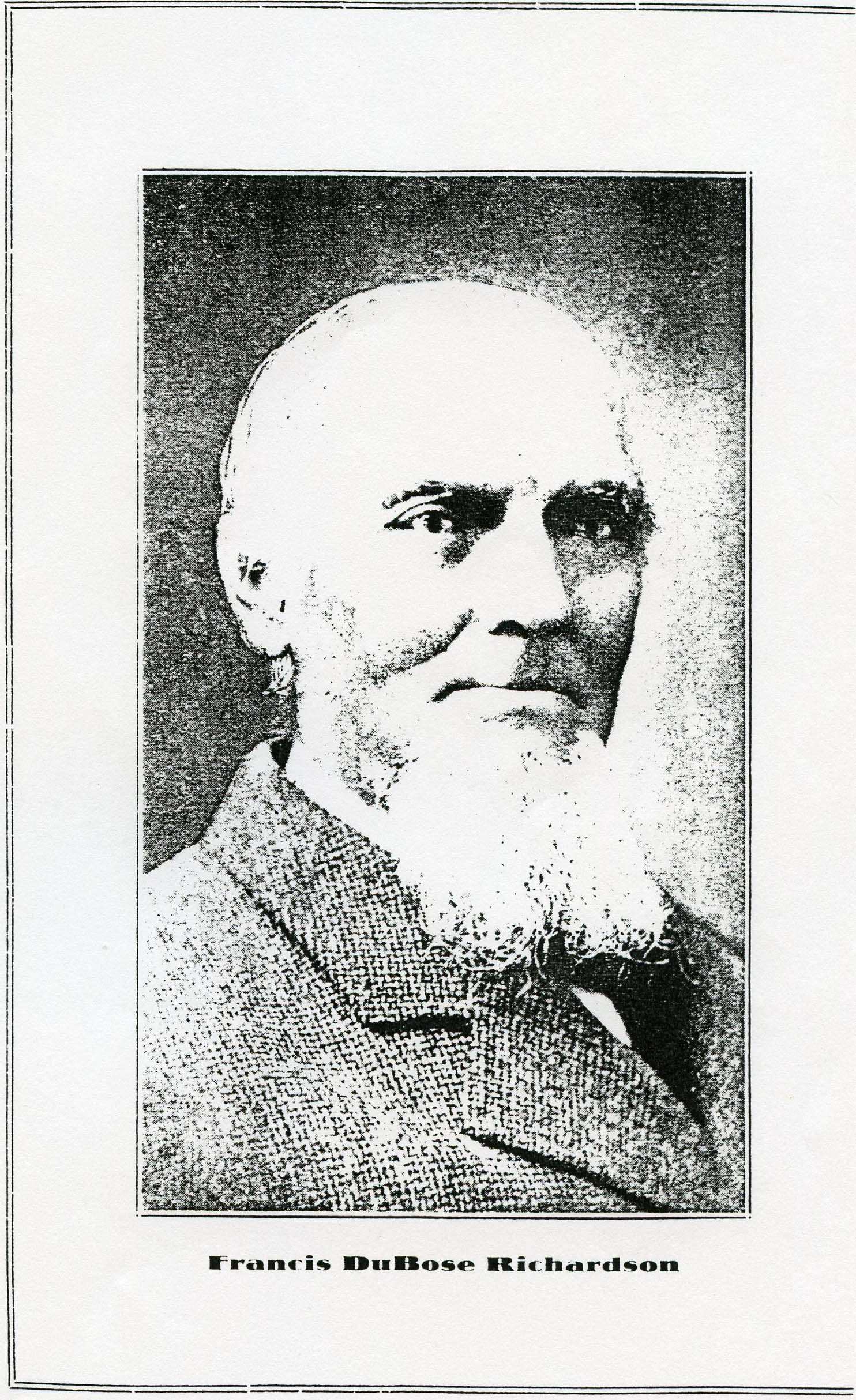
These three pages are followed by 31 pages of text.
The text – except for the handwritten cover – appears to be typeset as all text is fully justified with even right and left margins.
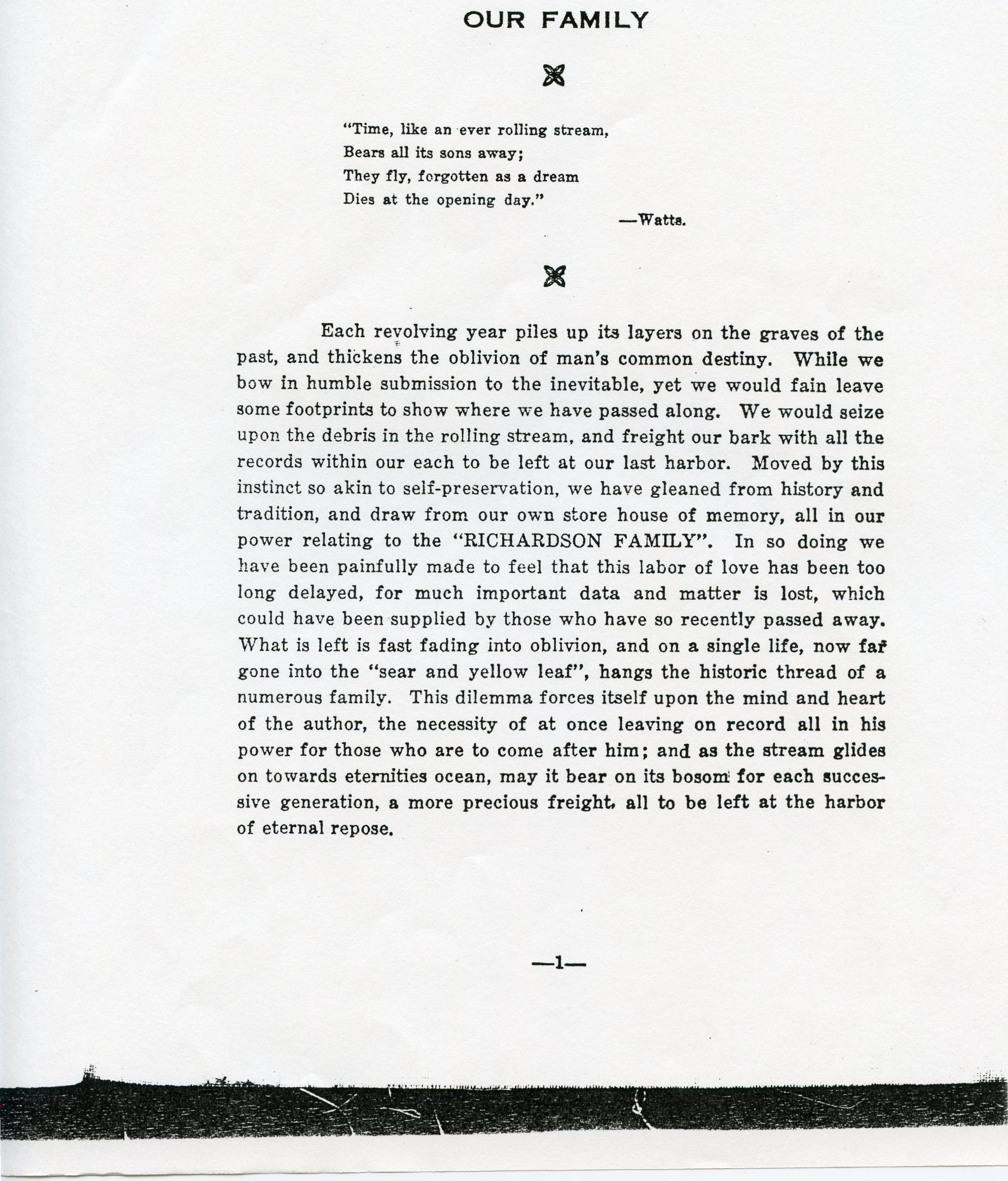
First page of text
The document deals primarily with the story of members of the Richardson family who moved from their home in South Carolina to near Woodville, Mississippi, in 1808 – 1811. The main figure in the document is John Gaulden Richardson, b. 28 February 1785 in Sumter District, SC; d. 19 January 1856, New Iberia, LA.
This document is written in the flowery prose of the late 19th Century. No sources are cited anywhere in the document. Thus, I assume the document is just what it purports to be -- the recollections of Francis Dubose Richardson. He was the son of John Gaulden Richardson who, with his brother and "100 slaves" trekked from their family's home in South Carolina to southwest Mississippi in 1808-1010 where they settled near Woodville, Wilkinson County, Mississippi. Francis DuBose Richardson was born in Wilkinson County in 1812 and died in New Iberia, LA, in 1901. The document focuses almost entirely on the life and exploits of John G. Richardson, the father of the author. It would seem as though Francis DuBose Richardson's memoirs would include more material than this, but, the document appears to be complete as it stands.
My connection: Francis DuBose Richardson (b. 1812, d. 1901; the subject of these memoirs) is the son of John Gaulden Richardson (b. 1785 in SC, d. 1856 in LA) who is the son of Francis Rivers Richardson (b. 1763 in SC, D. 1820 in MS). Francis Rivers Richardson had several children, two of his sons were John Gaulden Richardson and James B. Richardson (b. 1789 in SC, d. 1859 in MS). My great-great-grandfather is the son of James B. Richardson, the uncle of Francis DuBose Richardson, the subject of these memoirs.
The following is an outline of the information in this document
1. 1680 - 1750
A. About 1680 John Richardson "by birth a Welchman and his wife" emigrated from Great Britian and "with a large English colony, settled on the James River" (Virginia). "He remained there for over twenty years, becoming fully identified with the growing prosperity of his adopted country, and died leaving a numerous family."
B. Early 1700’s several of his children moved to the “Cape Fear River area of North Carolina.”
C. 1750: Members of the family settled in Sumter District, South Carolina.
2. Arthur Richardson
A. Born in North Carolina, 1730.
B. Captain Arthur Richardson fought with “Marion’s Men” during the Revolutionary War.
C. Wife; eight children. Only five children identified are: Francis; Henry; Stephen; a daughter who married a Cordell; daughter who married a Jackson.
D. He was killed “by a Tory” after the Revolutionary War in a dispute over ownership of property, possibly a horse.
i. Story is that the “Tory” who killed him was notorious for terrorizing families during the Revolutionary War. After the war the Tory was living in the Darlington area; Arthur Richardson went to his place of business to settle a dispute. A fight ensued and “the Tory” stabbed Richardson with a chisel.
3. Francis Richardson, 1760-1820
A. Son of Arthur Richardson; born 1760, near Statesburg, Sumter District, SC.
B. 1784: At age 24 married Martha Gaulden.
C. 1790: At Charleston, purchased 30 Negroes for “about $150 a head.”
i. One of the last survivors of this group was a slave named Leah who became the property “of the author” (Francis DuBose Richardson ?). She died in Iberia Parish, LA, in 1877, at approximately 107 years old.
D. 1800: He “heard stories” of land in the Territory of Mississippi. Later, after his two sons John G. and James B., emigrated to Mississippi, he moved there. Died near Woodville, MS, 13 December 1820.
E. Six sons, one daughter:
i. John Gaulden Richardson
ii. James B. Richardson (I am descended from James B. Richardson, 1789-1859 -> Robert Riley Richardson, 1812-1874 -> Reverdy Hunter Richardson, 1864-1916 -> Clarence James Richardson, 1896-1972 -> Annie Lee Richardson, 1924-2007 -> Joe Schlatter, 1944- )
iii. Susan Richardson; married Hiram Singleton
iv. Jarred Richardson; married ?? Harbor
v. Arthur Richardson; did not marry
vi. Wade Hampton Richardson; married ?? Harbor
vii. Francis Rivers Richardson; married a sister of Governor McGoffin of Kentucky and moved to Kentucky.
4. John Gaulden Richardson, 1785-1856
A. Born 28 February 1785, Sumter District, SC
B. He was chosen to lead the first trip by the Richardson family to the Mississippi Territory.
C. 5 December 1808: “First Monday in December 1808” he departed the family home.
i. Accompanied by “two slaves, Caesar and Pina.”
ii. “A two-horse covered wagon pulled by two mules;” carrying seed, farming and kitchen utensils.
iii. In Georgia, “engaged two Choctaw Indian guides.”
D. January 1809: Reached a settlement of friends from Georgia near Woodville, Mississippi.
i. Fourteen miles east of Woodville on the Woodville-Liberty road.
ii. Bought a quarter-section from a squatter named Clarke; this area is still known as Clarkesfield.
E. April 1809: Cleared land by burning the cane growing there and planted a cotton crop.
F. October 1809: Harvested the cotton, sold the crop for seed, returned to SC.
G. November 1809: Arrived at family home in SC.
i. 16 November 1809: married Margaret DuBose.
H. “Last Monday in November 1809,” departed with family, including one brother, and 100 slaves to return to Mississippi.
I. January 1810: Reached Wilkinson County.
J. 3 March 1813:
i. War of 1812 had broken out. John G. Richardson was commissioned Captain in “Mississippi troops” – possibly state militia.
ii. Marched with his company to Pensacola where they were under command of General Andrew Jackson.
iii. Remained there “until the end of the Florida War.”
K. 8 January 1815
i. Joined Jackson’s forces at New Orleans, fought in Battle of New Orleans.
L. Eventually promoted to Colonel.
M. 1826: Built a new house on the Woodville – Liberty Road, about one mile from the old house.
N. Children of John Gaulden Richardson and Margaret DuBose:
i. Martha Louise Richardson; 22 Aug 1810-After 1880
ii. Francis DuBose Richardson; 20 Aug 1812 - 1901
iii. Mary Elizabeth Richardson; 20 Aug 1813 – 6 Dec 1854
iv. Died in infancy – daughter.
v. John Wesley Richardson; 27 Sep 1814-17 May 1891
vi. Margaret Richardson; 27 Feb 1817-2 Nov 1852
vii. Edward Moore Richardson; 17 Sep 1818-12 Apr 1855
viii. Daniel DuBose Richardson; 7 Sep 1820-29 Sep 1855
ix. Robert Riley Richardson; 1823 - ???? (Note: My great-great-grandfather is a different Robert Riley Richardson, b. 1812, d. 1874; son of James B. Richardson (1789-1859) and Martha Mary Riley (1795-1867); grandson of Francis R. Richardson (1763-1820) and Martha Gaulden (1765-1832); great-grandson of Arthur Richardson, above.)
O. 1826: Wife, Margaret Dubose Richardson died.
P. John G. Richardson married “Mrs. Winningham” who died four months later.
Q. October 1829: Moved to “8 miles below New Iberia, LA” on Bayou Teche where he purchased a sugar plantation.
R. 1831: Married “Miss Lemon” of Adams County, MS. She lived 4-5 years after his death.
S. 1840: Sold the sugar plantation to his sons Edward and Daniel.
T. 19 January 1856: Died near New Iberia, LA.
The Memoirs of Francis DuBose Richardson
With the foregoing as background, I encourage you to read the memoirs which I have posted here. The document consists of 36 pages -- five introductory pages and 31 pages of memoirs. I scanned the document into .jpg files and have posted them here. Because these files are fairly large, I am putting only 3-4 of them per page, so, you'll have to go from page to page to read the full document.

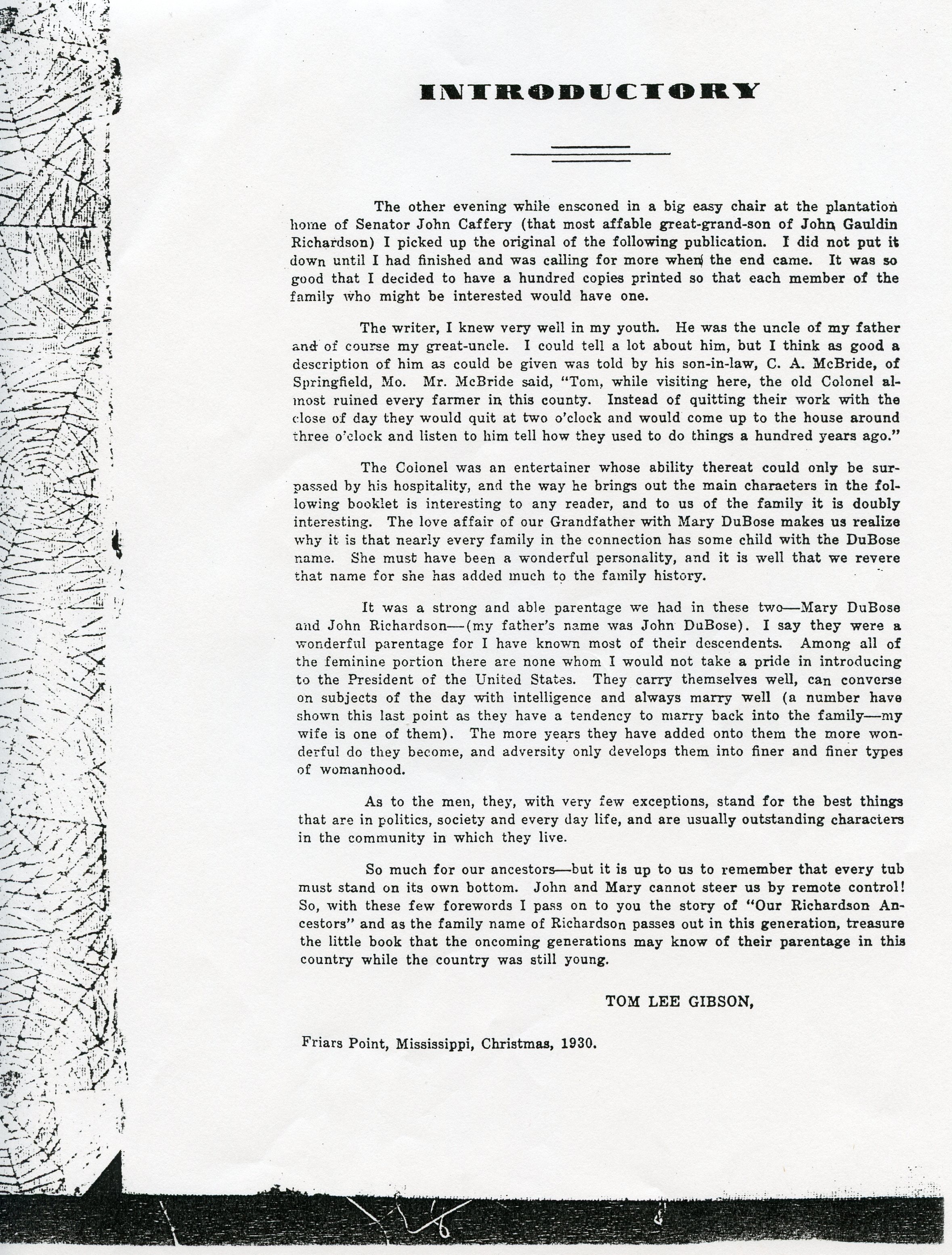


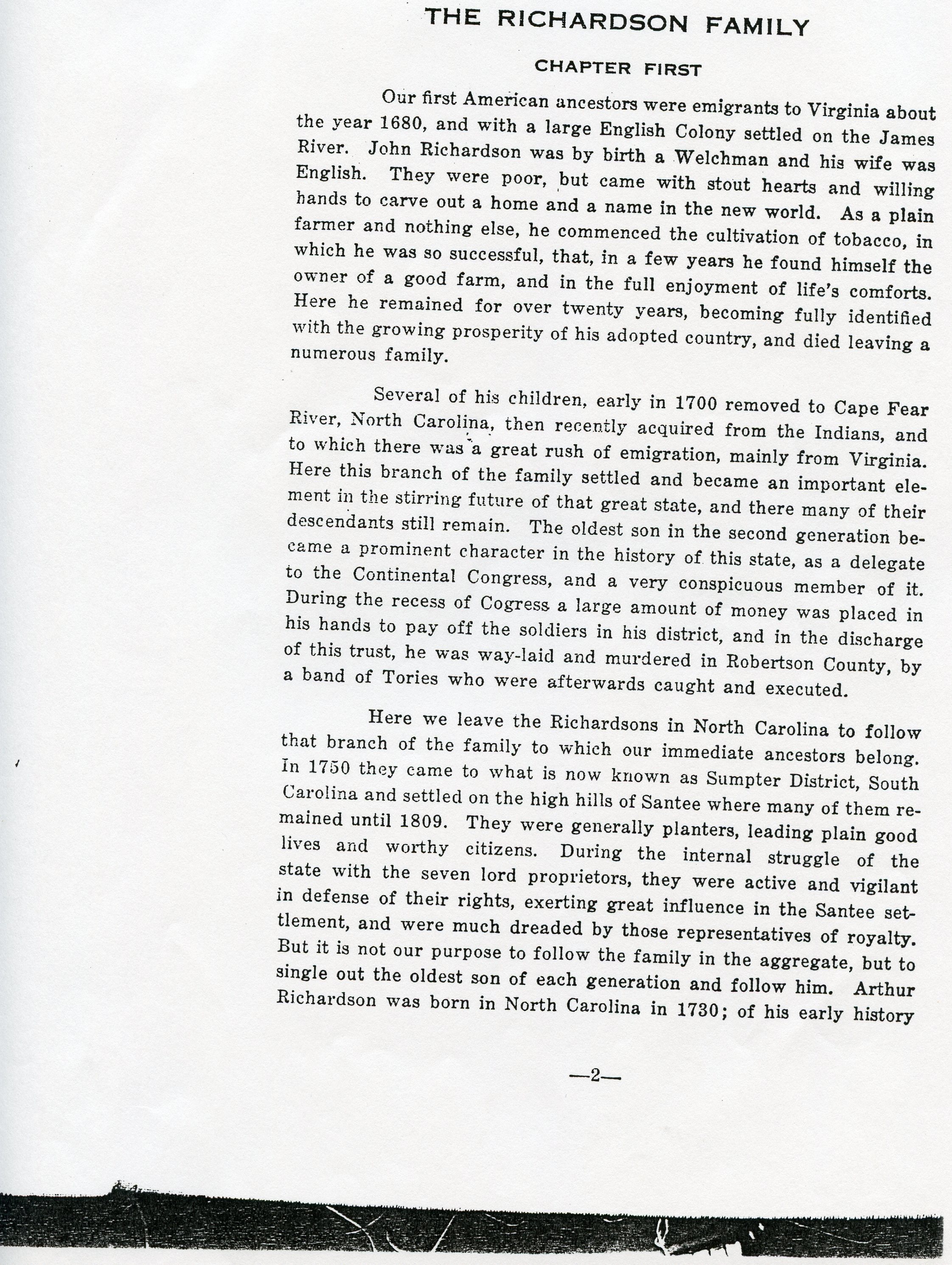
You are on page 1, next page is page 2.
| Memoirs of Francis DuBose Richardson -- page 1 |
| Page 2 |
| Page 3 |
| Page 4 |
| Page 5 |
| Page 6 |
| Page 7 |
| Page 8 |
| Page 9 |